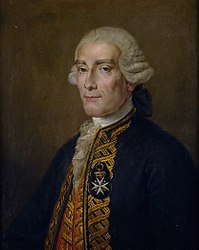Jorge Juan y Santacilia
| Jorge Juan y Santacilia | |
|---|---|

Portrait by Rafael Tegeo
|
|
| Born |
5 January 1713 Monforte del Cid, Spain |
| Died | 21 June 1773 (aged 60) Madrid, Spain |
| Nationality | Spanish |
| Fields | Mathematics |
Jorge Juan y Santacilia (Novelda (Alacant), January 5, 1713 – Madrid, June 21, 1773) was a Spanish mathematician, scientist, naval officer, and mariner.
Jorge Juan was born on the estate El Fondonet, the property of his grandfather don Cipriano Juan Vergara in Monforte del Cid, Alicante, Spain. He was baptised in the Church at Monforte del Cid. Juan was born of two distinguished families: his father was don Bernardo Juan y Canicia who came from the branch of the Counts of Peñalba, and his mother was doña Violante Santacilia y Soler de Cornellá, who came from prominent land-owning family in Elche. Both of his parents were widowed and remarried. They lived in their house on the Plaza del Mar in Alicante and only vacationed in Novelda.
His father died when Juan was only three years old and under the care of the Jesuits of the Jesuit school in Alicante. His uncle don Antonio Juan, a Canon at the Collegiate Church took charge of young Jorge and continued his education. Later another uncle, don Cipriano Juan, a Knight of the Order of Malta, took charge of his education and sent him to Zaragoza for a preparatory education for higher studies.
At the age of 12, he was sent to Malta to receive Holy Orders at the Order of Malta. The next yea,r he became page to the Grand Master don Antonio Manuel de Villena, who granted him the title of Commander of Aliaga in Aragón. Thus, he received his first title when he was only 14. Soon, he became a Knight of the Order of Malta, which implied lifelong celibacy.
In 1729, when he was 16, he returned to Spain and applied for entry to the Royal Company of Marine Guards, the Spanish military school for naval officers. He entered the academy in 1730 and studied modern technical and scientific studies subjects such as geometry, trigonometry, astronomy, navigation, hydrography, and cartography. He also completed his education in the humanities with classes in drawing, music, and dancing. He earned the reputation of being an outstanding student and his fellow students called him Euclid. He finished his studies at the academy in 1734. At the young age of 22, he was given command of a corvette and he participated in the expedition against Oran and the campaign of Naples.
...
Wikipedia
